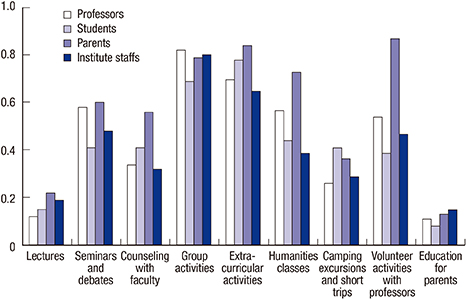J Korean Med Sci.
2016 Jun;31(6):829-835. 10.3346/jkms.2016.31.6.829.
A Study of Core Humanistic Competency for Developing Humanism Education for Medical Students
- Affiliations
-
- 1Department of Psychiatry and Behavioral Science, Seoul National University College of Medicine, Seoul, Korea. shinms@snu.ac.kr
- 2Department of Medical Education, Seoul National University College of Medicine, Seoul, Korea.
- 3Department of Forensic Medicine, Seoul National University College of Medicine, Seoul, Korea.
- 4Department of Physiology, Seoul National University College of Medicine, Seoul, Korea.
- 5Department of Ophthalmology, Seoul National University College of Medicine, Seoul, Korea.
- 6Department of Obstetrics and Gynecology, Seoul National University College of Medicine, Seoul, Korea.
- 7Department of Surgery, Seoul National University College of Medicine, Seoul, Korea.
- 8Department of Clinical Medical Sciences, Seoul National University College of Medicine, Seoul, Korea.
- KMID: 2373689
- DOI: http://doi.org/10.3346/jkms.2016.31.6.829
Abstract
- The authors conducted a survey on essential humanistic competency that medical students should have, and on teaching methods that will effectively develop such attributes. The participants consisted of 154 medical school professors, 589 medical students at Seoul National University College of Medicine, 228 parents, and 161 medical school and university hospital staff. They answered nine questions that the authors created. According to the results, all groups chose "morality and a sense of ethics," a "sense of accountability," "communication skills," and "empathic ability" were selected as essential qualities. According to the evaluation on the extent to which students possess each quality, participants believed students had a high "sense of accountability" and "morality," whereas they thought students had low "empathic ability," "communicate," or "collaborate with others". In terms of effective teaching methods, all sub-groups preferred extracurricular activities including small group activities, debates, and volunteer services. With regard to the speculated effect of humanism education and the awareness of the need for colleges to offer it, all sub-groups had a positive response. However the professors and students expressed a relatively passive stance on introducing humanism education as a credited course. Most participants responded that they preferred a grading method based on their rate of participation, not a relative evaluation. In order to reap more comprehensive and lasting effects of humanism education courses in medical school, it is necessary to conduct faculty training, and continuously strive to develop new teaching methods.
Keyword
MeSH Terms
Figure
Cited by 2 articles
-
Evaluation of Medical Humanities Course in College of Medicine Using the Context, Input, Process, and Product Evaluation Model
So Young Lee, Seung-Hee Lee, Jwa-Seop Shin
J Korean Med Sci. 2019;34(22):. doi: 10.3346/jkms.2019.34.e163.Medical ethics education in the medical school curriculum
Jang Han Kim
J Korean Med Assoc. 2017;60(1):18-23. doi: 10.5124/jkma.2017.60.1.18.
Reference
-
1. Yang EB, Meng KH. Five suggestions for future medical education in Korea. Korean J Med Educ. 2014; 26:167–178.2. You HJ. Two aims of medical humanities education: good doctors and happy doctors. Korean J Med Rev. 2015; 17:51–56.3. Mueller PS. Incorporating professionalism into medical education: the Mayo Clinic experience. Keio J Med. 2009; 58:133–143.4. Lee YM, Ahn DS. A preliminary study for exploring the attributes of being a "Good Doctor". Korean J Med Educ. 2007; 19:313–323.5. Kim DH, Kim EJ, Hwang J, Shin JS, Lee S. What is the current orientation of undergraduate medical education in Korea? Korean J Med Educ. 2015; 27:87–98.6. Ahn DS. The future roles of Korean doctors: cultivating well-rounded doctors. Korean J Med Rev. 2014; 16:119–125.7. World Federation for Medical Education (DK). The Global Role of the Doctior in Health Care: Report of the Meeting of the WFME Task Force. Copenhagen: World Fedration for Medical Education;2010.8. Ministry of Health and Welfare (KR). Global Role of Korean Doctor. Seoul: Ministry of Health and Welfare;2014.9. Hong SH. Application to the dilemma discussion program: ethics and character education for medical students. Korean J Med Rev. 2009; 11:3–14.10. Lee YH, Lee YM, Kwon HJ. Development of a code of professional conduct for medical students and residents. Korean J Med Educ. 2014; 26:321–333.11. Weissmann PF, Branch WT, Gracey CF, Haidet P, Frankel RM. Role modeling humanistic behavior: learning bedside manner from the experts. Acad Med. 2006; 81:661–667.12. Birden H, Glass N, Wilson I, Harrison M, Usherwood T, Nass D. Teaching professionalism in medical education: a best evidence medical education (BEME) systematic review. BEME Guide No. 25. Med Teach. 2013; 35:e1252–66.13. Cohen LG, Sherif YA. Twelve tips on teaching and learning humanism in medical education. Med Teach. 2014; 36:680–684.
- Full Text Links
- Actions
-
Cited
- CITED
-
- Close
- Share
- Similar articles
-
- Nursing Core Competencies Needed in the Fields of Nursing Practice for Graduates in Nursing
- Strategy for Improving Core Nursing Competency-based Education
- Humanities in medical education: between reduction and integration
- The Impact of Grit on University Student's Core Competency in Dental Hygiene Students
- Developing a core competency model for translational medicine curriculum


